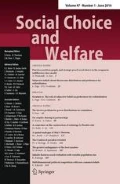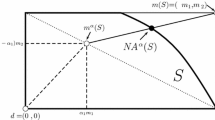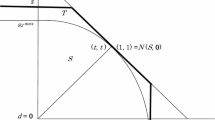Abstract
Rubinstein et al. (Econometrica 60:1171–1186, 1992) introduced the Ordinal Nash Bargaining Solution. They prove that Pareto optimality, ordinal invariance, ordinal symmetry, and IIA characterize this solution. A feature of their work is that attention is restricted to a domain of social choice problems with an infinite set of basic allocations. We introduce an alternative approach to solving finite social choice problems using a new notion called the Ordinal Egalitarian (OE) bargaining solution. This suggests the middle ranked allocation (or a lottery over the two middle ranked allocations) of the Pareto set as an outcome. We show that the OE solution is characterized by weak credible optimality, ordinal symmetry and independence of redundant alternatives. We conclude by arguing that what allows us to make progress on this problem is that with finite choice sets, the counting metric is a natural and fully ordinal way to measure gains and losses to agents seeking to solve bargaining problems.
Similar content being viewed by others
References
Anbarci N (1993) Noncooperative foundations of the area monotonic solutions. Q J Econ 108: 245–258
Anbarci N, Bigelow J (1994) The area monotonic solution to the cooperative bargaining problem. Math Soc Sci 28: 133–142
Brams S, Kilgour D (2001) Fallback bargaining. Group Decis Negot 10: 287–316
Camerer C (1989) An experimental test of several generalized utility theories. J Risk Uncertain 2: 61–104
Chew SH (1989) Axiomatic utility theories with the betweenness property. Ann Operat Res 19: 273–298
Conley JP, Wilkie S (1996) An extension of the nash bargaining solution to nonconvex problems. Games Econ Behav 13: 26–38
Dekel E (1986) An axiomatic characterization of preferences under uncertainty: weakening the independence axiom. J Econ Theory 40: 304–318
Dhillon A, Mertens JF (1999) Relative utilitarianism. Econometrica 68: 417–498
Fishburn P (1983) Transitive measurable utility. J Econ Theory 31: 293–317
Grant S, Kajii A (1995) A cardinal characterization of the Rubinstein–Safra–Thomson axiomatic bargaining theory. Econometrica 63: 1241–1249
Harless D, Camerer C (1994) The predicted utility of generalized utility theories. Econometrica 62: 1251–1289
Hanany E, Safra Z (2000) The existence and uniqueness of the ordinal nash outcomes. J Econ Theory 90: 254–276
Karni E, Schmeidler D (1991) Utility theory with uncertainty. Handbook of mathematical economics, vol IV. Elsevier, Amsterdam
Kibris O (2004) Egalitarianism in ordinal bargaining: the Shapley–Shubik rule. Games Econ Behav 49: 157–170
Kibris O, Sertel M (2007) Bargaining over a finite set of alternatives. Soc Choice Welfare 28: 421–437
Machina M (1984) Temporal risk and the nature of induced preferences. J Econ Theory 33: 199–231
Machina M (1987) Choice under uncertainty: problems solved and unsolved. J Econ Perspect 1: 121–154
Mariotti M (1998) Nash bargaining theory when the number of alternatives can be finite. Soc Choice Welfare 15: 413–421
Nash J (1950) The bargaining problem. Econometrica 18: 155–162
Neilsen WS (1992) A mixed fan hypothesis and its implications for behavior towards risk. J Econ Behav Organ 19: 197–212
Roemer J (1986) The mismarriage of bargaining theory and distributive justice. Ethics 96: 88–110
Rothchild M, Stiglitz J (1970) Increasing risk I: a definition. J Econ Theory 2: 225–243
Rubinstein A, Safra Z, Thomson W (1992) On the interpretation of the nash bargaining solution and its extension to non-expected utility preferences. Econometrica 60: 1171–1186
Safra Z, Samet D (2004) An ordinal solution to the bargaining problem with many players. Games Econ Behav 46: 129–142
Sakovics J (2004) A meaningful two-person bargaining solution based on ordinal preferences. Econ Bull 3(26): 1–6
Samet D, Safra Z (2005) A family of ordinal solutions to bargaining problems with many players. Games Econ Behav 50: 89–106
Segal U (1990) Two stage lotteries without the reduction axiom. Econometrica 58: 349–377
Shapley L (1969) Utility comparison and the theory of games. In: La Decision: Aggregation et Dynamique des Ordres de Preference, CNRS, Paris, pp 251–263
Shubik M (1982) Game theory in the social sciences. MIT Press, Cambridge
Starmer C. (1992) Testing new theories of choice under uncertainty using the common consequence effect. Rev Econ Stud 59: 813–830
Thomson W (1996) Bargaining theory: the axiomatic approach. Academic Press, New York
Author information
Authors and Affiliations
Corresponding author
Rights and permissions
About this article
Cite this article
Conley, J.P., Wilkie, S. The ordinal egalitarian bargaining solution for finite choice sets. Soc Choice Welf 38, 23–42 (2012). https://doi.org/10.1007/s00355-010-0516-z
Received:
Accepted:
Published:
Issue Date:
DOI: https://doi.org/10.1007/s00355-010-0516-z




